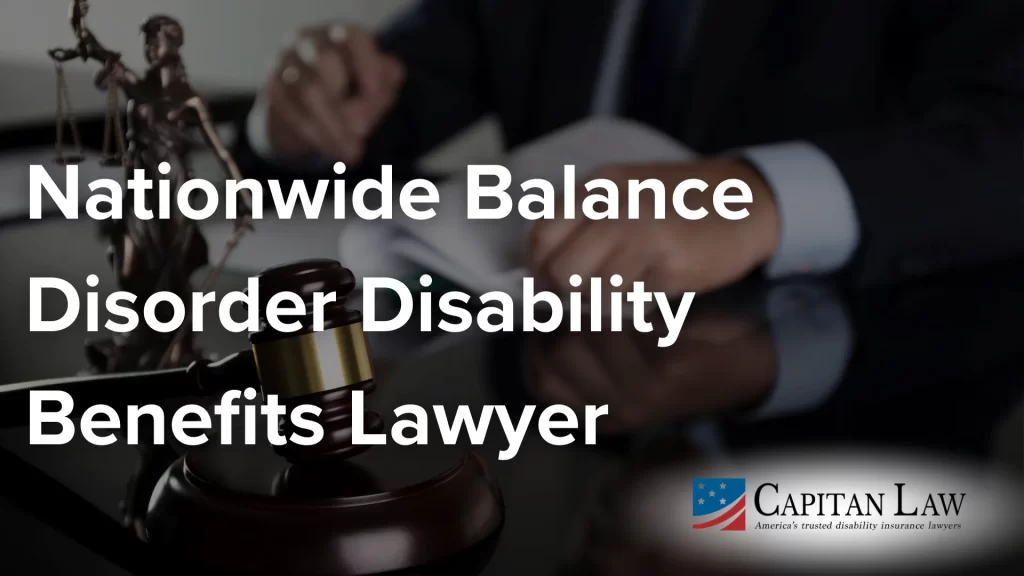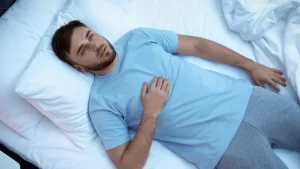 Do you or your loved one need help to get long-term disability benefits for a vestibular disorder that has created balance issues that prevent you from working? If so, the experienced long term disability lawyers of Capitan Law have the skill and resources necessary to help you get the full benefits you’re entitled to.
Do you or your loved one need help to get long-term disability benefits for a vestibular disorder that has created balance issues that prevent you from working? If so, the experienced long term disability lawyers of Capitan Law have the skill and resources necessary to help you get the full benefits you’re entitled to.
The vestibular system, primarily responsible for balance issues, is composed of parts of the brain and inner ear and provides information about motion, head position, and spatial orientation involved with motor functions. Vestibular disorders are usually injuries or damage to the processing areas and create numerous balance issues for a person.
Vestibular dysfunction could stem from a variety of common kinds of accidents, including car crashes and common workplace accidents. People who are dealing with these kinds of issues often struggle to get an accurate diagnosis of what is causing their problems, and frequently have considerable difficulty obtaining help in overcoming them.
Our firm is dedicated to helping clients all over the country with long term disability claims. We will discuss your situation, review your insurance policy, and discuss your options when you call (267) 419-7888, or contact us online to take advantage of a confidential consultation.
Do I Need A Balance Disorder Lawyer?
Balance disorders can be one of the most challenging kinds of conditions to prove to obtain disability benefits. Without a lawyer, you could face months, or even years, of struggling to prove your disability. You may find yourself filing multiple appeals and could wind up with absolutely nothing to show for your efforts if you cannot satisfy the SSA.
When you hire a disability attorney, you will be able to take advantage of their knowledge and experience with the often-confusing disability claims process. A skilled lawyer will have a better understanding of exactly which kinds of medical records will be most beneficial in helping you obtain needed benefits in these cases, and they will be able to help you overcome any possible issues that arise with your case.
A lawyer will be able to determine all of the benefits that you are entitled to and also help you get the most from your policy. An attorney can also handle an appeal when one is necessary and help you when a second medical opinion is needed.
Balance disorders can be extremely challenging disability claims, and insurance companies are not always fair in their evaluations of these claims. People may struggle on their own to try to prove the true nature of their challenges, but a lawyer will be able to properly help you get the benefits that you are entitled to.
Why Choose Capitan Law to Handle my Balance Disorder Case?
Capitan Law represents clients all over the United States. We have multiple locations in Pennsylvania, including offices in Philadelphia, Chadds Ford, and Newtown Square. We also have a convenient location in Louisville, Kentucky.
Super Lawyers named Joe Capitan a Pennsylvania Rising Star in 2013, 2014, 2015, 2016, and 2017. He maintains memberships in the Pennsylvania Association for Justice, the Philadelphia Bar Association, and the Pennsylvania Bar Association.
An excellent reason to work with Capitan Law is that it will come at no up-front cost to you. We handle cases on a contingency fee basis, which means that you only pay when you receive a monetary award.
Types of Balance Disorder Cases We Handle
Section 2.07 of the Listings of Impairments published by the SSA (known as the “Blue Book”) states that a disturbance of labyrinthine-vestibular function, including Ménière’s disease, is characterized by:
- A history of frequent attacks of balance disturbance
- Tinnitus (ringing in the ears)
- A progressive loss of hearing
A person must suffer from all of these symptoms to satisfy the disability listing for vestibular disorders. Common kinds of vestibular disorders include:
- Vertigo. Vertigo is simply another name for dizziness, with symptoms including disorientation, a feeling of being in motion, and motion sickness. Vertigo can commonly affect people’s ability to work, but it can be a difficult condition to obtain benefits for when a person is not experiencing tinnitus. The SSA can use specific medical-vocational allowances in its consideration of disability claims relating to vertigo that are filed by older individuals.
- Persistent Postural-Perceptual Dizziness (PPPD). Called initially phobic postural vertigo (PPV), PPPD involves dizziness and unsteadiness without vertigo, which cannot be explained by any neurological disorder. Later studies led to the development of what was then called chronic subjective dizziness (CSD) before scientists reached a consensus on the key symptoms and defined a diagnosis of PPPD. Symptoms may be treated with selective serotonin reuptake inhibitors (SSRIs) or serotonin-norepinephrine reuptake inhibitors (SNRIs). Symptoms may persist daily for several months.
- Ménière’s Disease. A specific inner-ear condition that can cause vertigo; it often makes disability claims easier to satisfy SSA standards because it frequently involves ringing in the ears. Hearing loss can come and go, but some sufferers may permanently lose their hearing. Causes of Ménière’s disease are complicated to determine, but issues often relate to fluid in the ear, which may be the result of improper fluid drainage, viral infections, abnormal immune responses, or simple genetic predisposition.
- Perilymph Fistula (PLF). Tears, defects, or other abnormal connections in the small, thin membranes separating the air-filled middle ear from the fluid-filled perilymphatic space of the inner ear can lead to fluid leaking into the middle ear. Those afflicted suffer from the dizziness that does constitutes neither true vertigo nor motion intolerance. Surgery is required in some cases to avoid possible hearing loss.
- Secondary Endolymphatic Hydrops (SEH). Endolymph is the fluid in the endolymphatic sac, a compartment of the inner ear. Primary idiopathic endolymphatic hydrops is also known as Ménière’s disease (see above) and occurs for no known reason, but SEH usually occurs in response to head trauma. SEH may involve tinnitus, hearing loss, and dizziness. SEH symptoms are not as aggressive as those associated with Ménière’s disease, with treatment focused on stabilizing fluid levels.
- Vestibular Neuritis (Labyrinthitis). Infections that inflame the inner ear, or nerves connecting the inner ear to the brain, can also disrupt the transmission of sensory information to the brain, causing vertigo, dizziness, or other balance issues. The labyrinth is a system of tubes filled with fluid and sacs that are responsible for hearing and balance. Neuritis refers to inflammation of the nerves associated with balance, but labyrinthitis is an infection that affects both branches of the vestibulocochlear nerve and causes both hearing issues and dizziness or vertigo.
Not all balance issues are easily diagnosable, and it can be tough for people to get answers to what is causing their balance problems. If you are dealing with any kind of vestibular disorder, you will want to get a lawyer involved as soon as possible for help determining what options you have and making sure you are getting the best possible treatment for your condition.
Balance Disorder Statistics
 The Vestibular Disorders Association (VeDA) hs reported that up to 35% of adults 40 years of age or older in the United States – or about 69 million Americans – have experienced some form of vestibular dysfunction. VeDA stated that the National Institute on Deafness and Other Communication Disorders (NIDCD) reported that 4% of American adults (or 8 million) reported a chronic problem with balance, with another 1.1 percent (or 2.4 million) reporting a chronic dizziness problem.
The Vestibular Disorders Association (VeDA) hs reported that up to 35% of adults 40 years of age or older in the United States – or about 69 million Americans – have experienced some form of vestibular dysfunction. VeDA stated that the National Institute on Deafness and Other Communication Disorders (NIDCD) reported that 4% of American adults (or 8 million) reported a chronic problem with balance, with another 1.1 percent (or 2.4 million) reporting a chronic dizziness problem.
According to VeDA, 80% of people 65 years of age and older have experienced dizziness. Benign paroxysmal positional vertigo (BPPV) is the most common vestibular disorder and the cause of approximately 50% of dizziness in older people. A 2014 study published in the Journal of Vestibular Research found that BPPV was the most common vestibular disorder, possibly accounting for as many as one-third of vertigo presentations to dizziness clinics.
The American Speech-Language-Hearing Association (ASHA) reported in 2014 that about 40% of the American population would experience some form of dizziness or balance difficulty over the course of a lifetime. ASHA also noted that a 2006 study found that dizziness and vertigo were estimated to occur between 8 and 18% of children, while a 1999 study found that 15 percent of school-aged children had experienced at least one episode of vertigo in the previous year.
Contact a Balance Disorder Disability Attorney
If you or your loved one are struggling to secure long term benefits for a balance disorder, know that you don’t have to handle your disability claim on your own, and hiring a lawyer could ensure that you get the full benefits you deserve. Contact the disability attorneys of Capitan Law right away to get assistance with every aspect of your disability case. Our firm will work tirelessly to help you get all of the benefits you need and deserve. Call (267) 419-7888, or contact us online, to set up a free consultation.